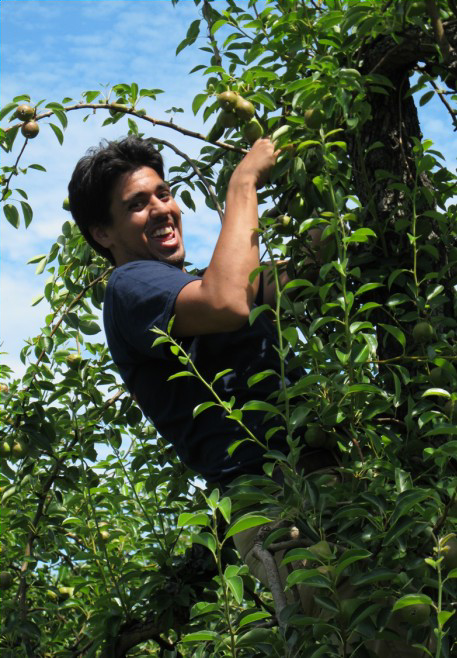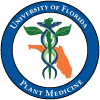Dr. Rafael (Andy) Vega
 by Nicole Casuso | DPM Spring 2016 Newsletter
by Nicole Casuso | DPM Spring 2016 Newsletter
Q. Briefly describe your academic background.
A. I received my B.S. degree in Computer Engineering from Northeastern University. Since I had received my degree in a very different field of science, I completed pre-requisite coursework at the University of Massachusetts at Amherst, prior to enrolling in the DPM Program.
Q. What is your current occupation and how has your DPM degree aided you the tasks and responsibilities asso-ciated with your position?
A. I currently work as a Crop Consultant, Research Manager, and equal partner of New England Fruit Consultants (NEFCON). Our private company serves five states in the Northeast including Massachusetts, Connecticut, New Hampshire, New York’s Hudson Valley, and Vermont. NEFCON provides consulting services for over 5000 acres of tree fruit. I provide consultations for roughly 2000 acres of fruit trees such as apples, peaches, etc. My DPM background in insect identification diagnosis is used on a daily basis. Inset toxicology and a thorough understanding of their metabolic pathways has been especially useful. Key plant pathology concepts and methods that I learned during the disease clinic internship is invaluable with my job. I do approximately 80% of the initial diagnosis. Additional comprehension of disease control and management is critical. Fundamental knowledge of herbicide interactions and their efficacy also plays an important role in the field. Most of the problems we see in orchards are abiotic, due to cultural practices, phytotoxicity, or deficiencies. Currently, I am in my 6th growing season and the diverse skill set I have from my DPM degree continues to give me a competitive advantage in the field. Overall, I enjoy the immediate impact and substantial influence my advice can have at the commercial level.
Q. What prompted you to pursue your present career and where are you located?
A. Since I am originally from New England, the thought of returning there for a career seemed natural. Independent crop consulting is a very unique field with and the Northeast could use the skillset that DPMs are graduating with. My present career offered me independence to make my own schedule and flexible hours to coincide with changing weather patterns. There was a great deal of flexibility, especially during the off season when I have time to attend lots of trainings, meetings, and remain actively engaged with the community and the growers. The consultant position seemed to balance many of my interests in learning, teaching, and conducting self-motivated research
Q. Why did you choose to enroll in the DPM program?
A. I wanted a multi-disciplinary background that was not restricted to any particular field that I had seen in other programs. I was interested in diagnostic work and definitely wanted to do some research but not exclusively. I also liked the idea of teach-ing but again, not exclusively. Field work was also a must have, but I didn’t want to commit to being a full-time grower or farm manager. The DPM Program encompassed all of my main goals.
Q. How did you find out about the DPM Program?
A. I used to work as a horticulturalist at the Zoo New England. They had insect and disease problems that sparked my interest to look for programs that gave a strong background in IPM. I then found myself caught between working in entomology and pathology. That’s when I found the DPM Program.
Q. From a personal standpoint, how has your DPM degree influence you?
A. I feel like an ambassador for agriculture and the plant industry in general. Explaining the DPM title itself is actually a really wonderful ice-breaker because it’s a way to gauge people’s interest and knowledge level of the subject. I’ve had some really great conversations with people about the program. I have always been passionate about food, how it is made, how it’s grown, and industry. Currently I am involved with the Northeast Organic Farming Association (NOFA/Mass). We educate people to help them understand the pesticide/organic controversy. We try to show them the importance of industry as well as consumer education. Explaining the acronym is actually a really wonderful ice-breaker.
Q. Are there any challenges that your DPM degree has helped you overcome?
A. Being prepared for natural disasters and emerging pests and pathogens (i.e. Brown Marmorated Stink Bug or disease outbreaks) is something the DPM Program definitely helped me with. There is also a type of psychology involved with being a consultant. People skills are crucial. Being able to communicate with researchers and translate that to applicable knowledge for growers and farm workers can often be a difficult challenge. My involvement both during the DPM Program and during my internships has really helped me with this.
Q. Any other words you would like to share with DPM students?
A. I strongly encourage each of you to be active and engaged. Networking cannot be stressed enough. It really is important. Don’t be afraid to establish and develop your own niche within the department and the plant industry community!
